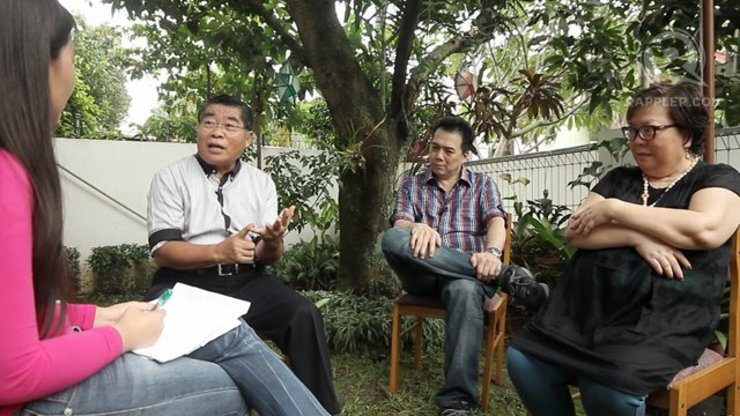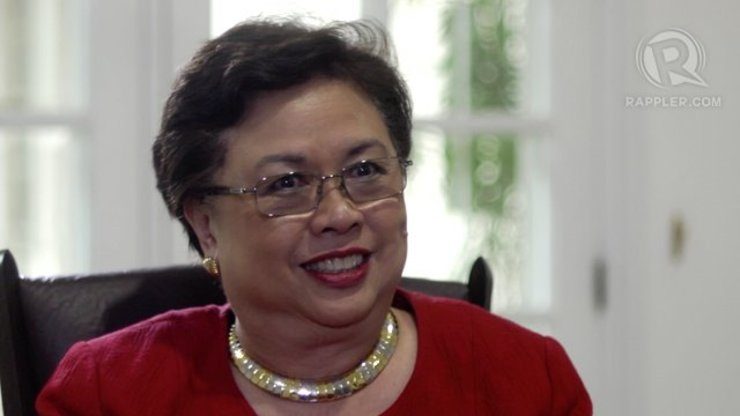SUMMARY
This is AI generated summarization, which may have errors. For context, always refer to the full article.

JAKARTA, Indonesia – It’s a common sight in Filipino communities abroad. Every weekend, Pinoys gather for a meal and meet in church. It’s a similar picture here but with some differences. Over breakfast of champorado, crispy pata and Cabanatuan longanisa, they swap stories about their latest business ventures, golf, and who their drivers and domestic helpers are voting for in the upcoming election.
Filipinos in Indonesia call themselves architects of business. They’re a key part of the success story of the world’s fourth most populous country. While other Pinoys endure domestic work and discrimination in other countries, many Filipinos here enjoy a more comfortable life.
“Filipinos in Indonesia are professionals at all levels,” said Philippine Ambassador to Indonesia Maria Rosario Aguinaldo. “They’re well-regarded, well-respected.”
Establishing their own businesses and lives here, Filipinos have much at stake in the future of Southeast Asia’s largest economy. In a conversation with Rappler, leaders of the Filipino community talk about doing business in Jakarta, and why the close race for the next Indonesian president matters to Filipinos here and back home. (READ: Fast Facts: Indonesia’s presidential election)
Pinoy managers abound
There are 9,844 Filipinos in Indonesia based on government data but unofficial estimates peg it higher at 15,000. The pioneers were accountants, bankers and engineers who helped Indonesia set up its industries during the Suharto years. One of them was SGV accountant Rodolfo Balmater, now head of his own Jakarta-based business consulting company after 3 decades.
“During the late eighties, they opened the capital markets and deregulated the banking sector, which precipitated the influx of foreign investments. They needed professionals to straighten out legal issues, accounting issues of the companies. They needed professionals from the Philippines, particularly those exposed to international work,” he said.
From the so-called “first wave,” the Filipino community grew to include professionals in mining, coal, advertising, public relations and education.
Accountant-turned-investment officer Thelma Victorio has been in Indonesia for 26 years. She helped set up its broadcasting industry and is known as the Pinoy community’s mother and CFO or “chief feeding officer.” Called Tita Thel, she takes pride in Filipinos’ contributions.
“In the shoe industry in Indonesia, most of them are graduates of Rubber World Philippines so these are the people who design the shoes. Name any brand – New Balance, Nike, Addidas, Reebok – all of these are managed by Filipinos in Indonesia.”
“If you see an ordinary English-speaking Indonesian kid in the mall who will be very proud in speaking in English, chances are, his teacher is Filipino,” she added.

‘Best friend in international community’
Filipinos have an easy time working in Indonesia, owing to what Ambassador Rosario calls “excellent relations” between the two neighbors. She attributes this to the personal ties of leaders dating back to Philippine President Elpidio Quirino and Indonesia’s revered founding father Sukarno.
Marking 65 years of diplomatic relations this year, the Philippines and Indonesia have ties covering a wide range of areas like defense and security, counter-terrorism, humanitarian and disaster risk response, energy, and tourism.
As founding members of the Association of Southeast Asian Nations (ASEAN), Indonesia and the Philippines work closely in the regional bloc, most prominently on issues like advocating for a Code of Conduct on the South China Sea. The two countries’ recent boundary treaty is hailed as a model for maritime dispute resolution, often discussed in relation to Beijing.
In business, it is the same story. Indonesia was the Philippines’ 13th major trading partner in 2013, with trade worth $3.5 billion. With a population of 250 million, Indonesia is a huge market and has rich natural resources like timber, oil, coal, gold and palm oil, rubber, pulp and paper.
Balmater said many businessmen in Mindanao are looking for partners in Indonesia in palm oil and rubber plantations.
“This is why we are very, very concerned about the leadership of Indonesia moving forward because this country is one of our best friends in the international community,” he said.
| PHILIPPINES-INDONESIA TIES IN NUMBERS | |
|---|---|
| 65 | Years of diplomatic ties |
| 13 | Indonesia’s rank as PH’s trading partner in 2013 |
| $3.5112 billion | trade between PH, Indonesia in 2013 |
| 9,844 | Filipinos in Indonesia |
| PH Exports to Indonesia | |
| Petroleum oils | |
| Copper ores | |
| Smoking tobacco | |
| Parts, accessories of motor vehicles | |
| Prepared explosives (other than propellent powders) | |
| PH Imports from Indonesia | |
| Coal | |
| Vehicles | |
| Copper ores | |
| Parts, accessories of machines | |
| Source: Philippine Department of Foreign Affairs | |
Lani Revilla and social media
In talking about Indonesia, Balmater switches identities. He said, “In palm oil, we are number one.” Victorio teased him about it. “You can see he is now representing Indonesia!”
The change shows how concerned old-timers are about the fate of Indonesia, especially as the country hands over leadership from one president to the next. (Check Rappler’s coverage of the Indonesian election.)
Victorio cannot help but comment on how involved and engaged Indonesians are in choosing their leader in an election where social media changed the game.
“Unlike in the Philippines, some do not know the candidates so in fact we accept names of Vilma Santos, movie actors but here, no. They know Jokowi is Jokowi. Kalla is Kalla. Prabowo is Prabowo. Because of social media, it’s not a play anymore of the owners of the traditional TV channels. It’s a free market because social media is very powerful,” she said.
Victorio said she stopped voting in the Philippines after seeing how money runs politics. “That’s why I hated the wife of Bong Revilla when she posted that people should stop asking help from them and therefore they will not be resorting to corruption. I was going through the roof because of that statement!”
The Filipino community’s resident political junkie Wence Singzon said that while Indonesia emerged from dictatorship only in 1998, its emerging economy and ability to prosecute and sentence top officials for corruption show remarkable progress.
“I don’t know if we can say now that they are more developed than the Philippines. We are in parallel,” said Singzon, a legal and business consultant in Indonesia since 1988. “ We want more governance, transparency so are we saying now that they are managing better than the Philippines? That’s the question.”

Jokowi effect in PH?
The pivotal election in Indonesia sparks talk of the Philippines’ own leadership change in 2016.
Singzon said the so-called Jokowi effect can also be applied to the Philippines, especially after the pork barrel corruption scandal. Jokowi is the nickname of presidential bet and Jakarta Governor Joko Widodo, who earned a reputation as both an incorruptible grassroots leader and effective administrator.
“The early showing of Jokowi that he is the leading candidate would show that people are really looking for change. I think it will also happen in the Philippines. The electorate would like to have a candidate who will bring change to promote good governance, transparency.”
Yet with the economy steering the growth of Manila and Jakarta, Balmater said that governance in both countries requires not just accountability but also management.
“So much is desired of this governance because foreign investors are attracted if the governance systems are in place and we can see a parallel thing happening in the Philippines. Once it’s properly managed, the direction of the country will be there.” – Rappler.com
Add a comment
How does this make you feel?
There are no comments yet. Add your comment to start the conversation.